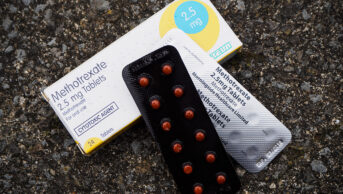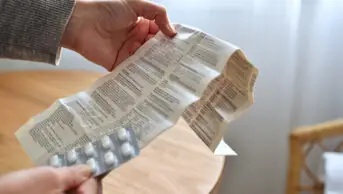
Shutterstock.com
The Medicines and Healthcare products Regulatory Agency (MHRA) has launched a review into safety issues around sodium valproate prescribing and is seeking views of patients and healthcare professionals in advance of a meeting of the Commission on Human Medicines.
Sodium valproate — prescribed in the UK under brands including Dyzantil (Aspire Pharma), Epilim (Sanofi), Episenta (Desitin Pharma) and Epival (Gerot Lannach UK) — is mainly used to treat epilepsy and bipolar disorder, but it can result in birth defects if taken during pregnancy.
In 2018, the MHRA said that valproate must not be prescribed to women or girls of childbearing age, unless they are on a pregnancy prevention programme (PPP). Its guidance states that any woman prescribed the drug should also receive a patient alert card that warns them of the dangers of taking the drug while pregnant.
However, in April 2022, NHS Digital published figures showing that around 50 pregnant women were prescribed sodium valproate between October 2020 and September 2021.
Following the publication of the NHS Digital figures, Jeremy Hunt, chair of the House of Commons Health and Social Care Committee, called for a ban on prescribing sodium valproate to pregnant women with epilepsy.
In June 2021, the MHRA and NHS Digital set up a valproate registry, which details the number of females prescribed valproate in England and any pregnancies among these women. The register also shows whether or not valproate continued to be prescribed during pregnancy.
Speaking to The Pharmaceutical Journal, a spokesperson for the MHRA spokesperson said: “As part of our engagement and involvement of patients and healthcare professionals in this safety issue, we are seeking their views and experiences on the current safety measures for sodium valproate.
“These views will inform a discussion on the safety of sodium valproate at the Commission on Human Medicines, which meets each month.
“We are absolutely committed to transparency and will communicate the outcome of the CHM discussions as soon as it is appropriate to do so,” they added.
The CHM advises government ministers on the safety, efficacy, and quality of medicines.
The Sodium Valproate Expert Working Group was set up in to advise the Commission on Human Medicines and “consider further regulatory measures required to minimise the risk of valproate use in pregnancy”.
Daniel Jennings, senior policy and campaigns officer at the charity Epilepsy Action, commented: “We welcome the MHRA review into the ongoing safety issues around valproate prescribing. It is clear there is still a lack of understanding around the risks of using the drug during pregnancy, and that more still needs to be done to communicate this to women with epilepsy.”
However, Jennings added: “Valproate remains an effective medication for people with epilepsy, and for many women it is the only medication that effectively controls their seizures. It is therefore vital that women are given the necessary information to make an informed decision about their treatment.
“[Epilepsy Action] would also call on the MHRA to include other epilepsy medications which the Commission on Human Medicines identified as posing a risk if taken during pregnancy in this review. Despite the evidence highlighted by this review, too little has been done to communicate these risks, and it is vital that the mistakes made around valproate are not repeated.”
Read more: Everything you need to know about sodium valproate and other antiepileptic drugs in pregnancy
You may also be interested in

Patient safety commissioner to approach PM over ‘disappointing’ delay to valproate compensation

GPhC writes to pharmacy teams after methotrexate dispensed with instruction to take once daily
